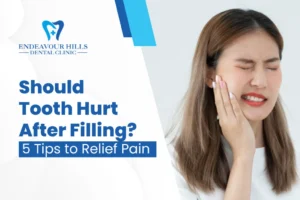Should Tooth Hurt After Filling? 5 Tips to Relief Pain

Understanding Post-Filling Tooth Pain
Dental fillings are a common procedure designed to restore teeth damaged by decay. While fillings aim to alleviate pain and restore function, it’s not uncommon to experience some discomfort afterwards. Here’s an overview of what you might experience and how to manage it effectively.
After a filling, the tooth and surrounding area may be sensitive. This sensitivity can result from several factors, including the type of filling material used, the size and location of the filling, and how deep the decay was. Typically, this discomfort is temporary and should subside within a few days to a week. However, understanding the nuances of post-filling pain and knowing how to alleviate it can make a significant difference in your comfort level.
5 Tips for Managing Tooth Pain After a Filling
1. Over-the-Counter Pain Relief:
Taking non-prescription pain relievers like ibuprofen or acetaminophen can help manage discomfort. Always follow the dosage instructions on the label.
2. Avoid Extreme Temperatures:
Sensitivity to hot or cold foods and drinks is common after a filling. Stick to lukewarm or room temperature items to minimise discomfort.
3. Soft Diet:
Opt for soft foods that are easy to chew, such as mashed potatoes, yoghourt, and soup. This helps reduce the pressure on the filled tooth.
4. Saltwater Rinse:
Gently rinsing your mouth with warm saltwater can help reduce inflammation and promote healing. Mix half a teaspoon of salt in a cup of warm water and rinse your mouth gently.
5. Avoid Pressure:
Try to chew on the opposite side of your mouth from the filled tooth. This reduces the risk of aggravating the area and allows it to heal more effectively.
FAQs About Tooth Pain After a Filling
How long should tooth pain last after a filling?
It’s normal to experience mild sensitivity or discomfort immediately after getting a filling. This discomfort typically subsides within a few days to a week. If the pain persists or worsens beyond this timeframe, it may indicate other issues such as a high filling or an irritated nerve.
What can I do at home to relieve tooth pain after a filling?
Follow the following tips to relieve tooth pain after a filling:
- Take over-the-counter pain relievers like ibuprofen or acetaminophen as directed.
- Avoid extreme temperatures in foods and drinks.
- Rinse your mouth with warm saltwater.
- Stick to a soft diet to minimise pressure on the filled tooth.
Is it normal to experience sensitivity to hot or cold foods after a filling?
Yes, sensitivity to hot, cold, sweet, or sour foods is common after a filling. This sensitivity usually diminishes over time as the tooth adjusts to the new filling.
When should I contact my dentist about tooth pain after a filling?
Contact your dentist if:
- Pain intensifies or persists beyond a few days.
- You experience difficulty biting down or chewing.
- Sensitivity to hot or cold lasts longer than a couple of weeks.
- You notice signs of infection such as swelling, fever, or foul-tasting drainage.
Contact a Nearby Dentist for Severe Pain
If you’re experiencing prolonged or severe pain after a dental filling, or have any concerns about your dental health, don’t hesitate to contact nearby dentists. If you are around Endeavour Hills, you can contact our Endeavour Hills dentists to get the necessary guidance. Our experienced team is here to provide personalised care and ensure your dental health is in top condition.
More Resources:
Dental Fillings in Endeavour Hills
How long do composite fillings last?
